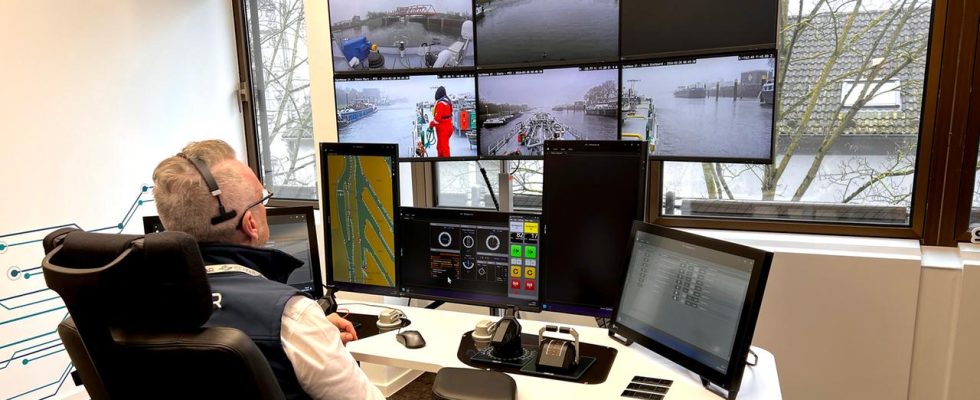Ships without crew will soon be sailing on German inland waters – remotely controlled with the help of cameras and radio. The control center in Duisburg has started test operations. Is this the future of shipping?
It is an extraordinary view for a ship captain. The tiled roofs of residential buildings can be seen across the street. Patrick Hertoge looks intently at six monitors. From the middle of Duisburg’s city center, he controls a barge that is several hundred kilometers away in Belgium on its way to Antwerp.
The systems are designed in the same way as in the helm of a ship. The cameras provide the captain with a panoramic view of the ship. “It’s the same as on board. If you can drive on board, you can also drive here,” said Hertoge. “We always have contact with the ships. If something goes wrong, we can always get in touch.” The system is still in test operation, and there is a second captain on the ship for safety reasons. But the ships will soon be controlled completely from the headquarters.
Around 8,000 inland waterway vessels sail in Europe
Steffen Bauer, managing director of the shipping company HGK-Shipping, is convinced that in the next five years ships will operate with “reduced crew numbers” – “on the Rhine, the West German canal network, the North German canal network.” And that this creates the conditions for ships to be able to drive fully autonomously at some point.
Around 8,000 inland vessels currently transport goods on Europe’s rivers and canals, but they spend more than half of their time in port. The skippers must continue to be paid during these loading times. Remote-controlled captains, however, do not.
But saving personnel costs is not the main reason for the new system, it is said. Rather, the shipping companies want to make the job more attractive again. Because this industry also has concerns about young talent and suffers from a shortage of skilled workers. Between 2008 and 2018, the professional group in Germany shrank by 24 percent. According to the HGK, a third of inland waterway ship captains are now over 55 years old. In the next ten years, many workers will be eliminated.
Remote control is intended to make the job more attractive for the next generation. “The young people clearly have the goal of spending more time with their family. The technological change would make it possible to work eight hours in the office, steer the ship and then go home to the family,” says Steffen Bauer.
More Ship transport only with Automation?
In neighboring Belgium, ships are already operating remotely. In order not to lose contact, 4G and 5G mobile networks from several providers are used at the same time.
Rupert Henn works at the development center for ship technology and transport systems. He considers the automation of shipping traffic to be essential. “The traffic of goods and logistics is becoming more and more important and is increasing. Road and rail have natural limitations,” says Henn. “One would like to get more transport from water, but as it stands, that’s almost not possible. The shortage of skilled workers is actually a big problem.”
Technology still needs to be used further developed become
However, the assistance systems are still in the development phase. “Some of them already work very well. They can be used very well in certain tasks. We don’t have full automation yet. The technology still needs to be further developed. That will take a few years,” he says.
According to the shipping company HGK, everything is done in close coordination with the authorities. In order for remote control of ships to go into regular operation in Germany, the authorities must also give their okay.

